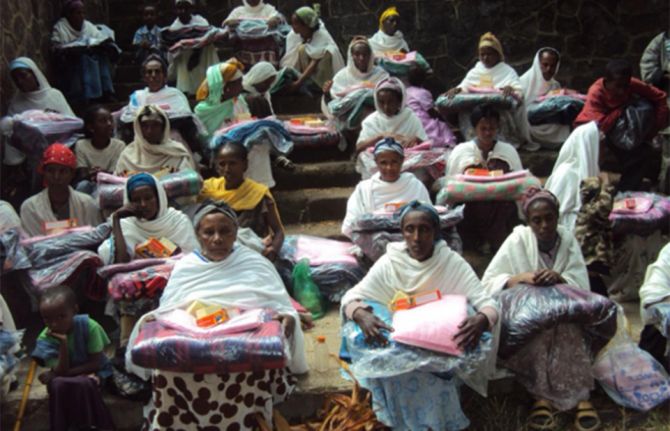
Feature Story
Ethiopia demonstrates that communities deliver
15 February 2019
15 February 2019 15 February 2019The Community, Health Education and Knowledge Building (CHECK) project in Ethiopia is a joint collaborative project between the Italian Agency for Cooperation and Development (IACS) and UNAIDS. The project aims to support awareness-raising on HIV prevention and increase demand for the uptake of HIV and other health services, including for noncommunicable diseases.
The project is run through four implementing partners in Hawassa, which lies in the Southern Nations, Nationalities and Peoples’ Region of Ethiopia. It focuses on women, young people and people living with HIV, including elderly people, female sex workers, prison inmates and the employees of private sector megaprojects.
On 7 February, Michel Sidibé, the Executive Director of UNAIDS, Tibero Chiari, the Director of IACS, and Seharla Abdulahi, the Ethiopian State Minister of Health, visited three CHECK project implementation sites in order to assess progress and meet people benefiting from the projects.
“HIV is a disruption of the social fabric that binds us together. But in Ethiopia, the community linkages hold the social antibodies to counteract HIV. When the community has the correct knowledge it can break the chain of HIV and create stronger linkages between people,” said Mr Chiari.
The Tilla Association of Positive Women runs an embroidery centre that supports women living with HIV in Hawassa through income-generating activities. At the centre, women living with HIV produce a range of knitted and embroidered items, such as school jerseys and uniforms for the security industry. Not only does the centre provide financial support for the women, it also provides a safe space and emotional support for the women who work there.
“Tilla is like your mother’s house,” said Aster Kebede, a woman living with HIV who works at the centre. “It is my home, my school, my work … my everything.”
The Medhin Elderly People Living with HIV Association is a short walk down the road from Tilla and has had the same impact on its members. Many of its members spoke of the impact that stigma and discrimination has had on their lives, especially as elderly people living with HIV, and the loss of husbands, wives, homes and incomes because of stigma. The association has also provided small grants to many of its members, who have used the catalytic funding to generate income, build small businesses and change their lives for the better.
“Medhin has restored my self-confidence,” said Bizunesh Kensa, a 64-year-old woman living with HIV. “I don’t feel I am vulnerable anymore; nor do I worry.”
The Hawassa Industrial Park is a megaproject employing 28 000 people, 92% of which are young women and many of whom are from the rural areas of the region. Through the CHECK project, the Regional Health Bureau in Hawassa has produced and disseminated materials on HIV prevention and sexual and reproductive health for workers at the megaproject.
“These projects demonstrate that what matters most is the lives of people. They show the power of community-based projects to restore the dignity of people living with HIV and give them hope for the future,” said Mr Sidibé.



